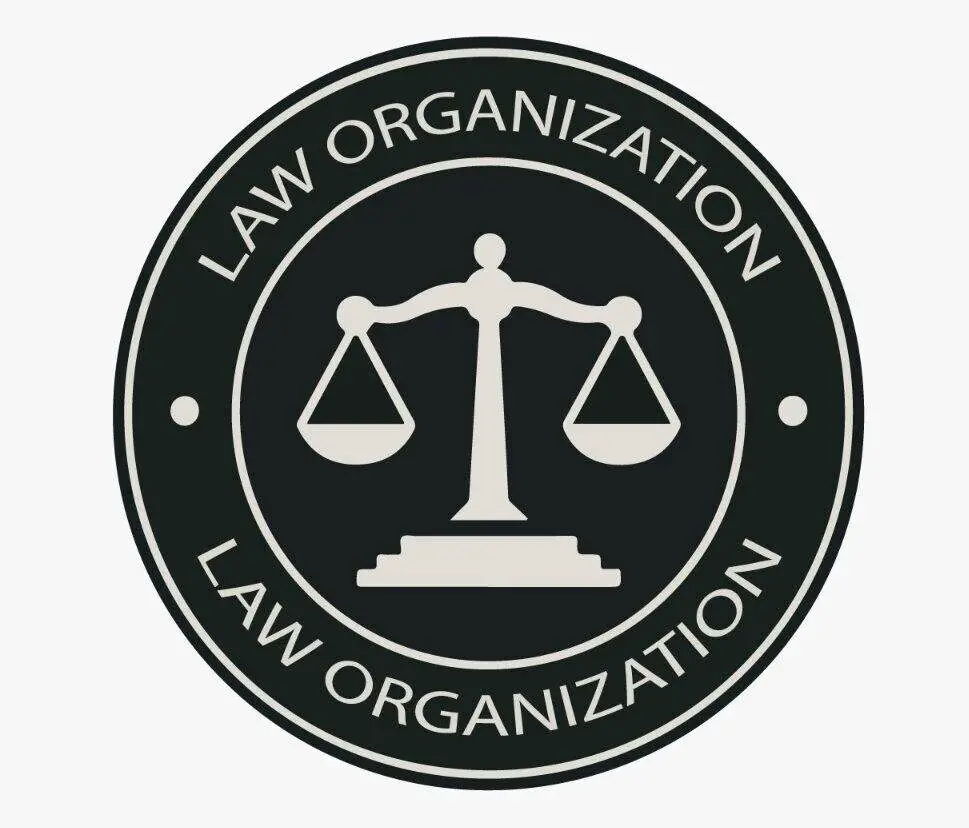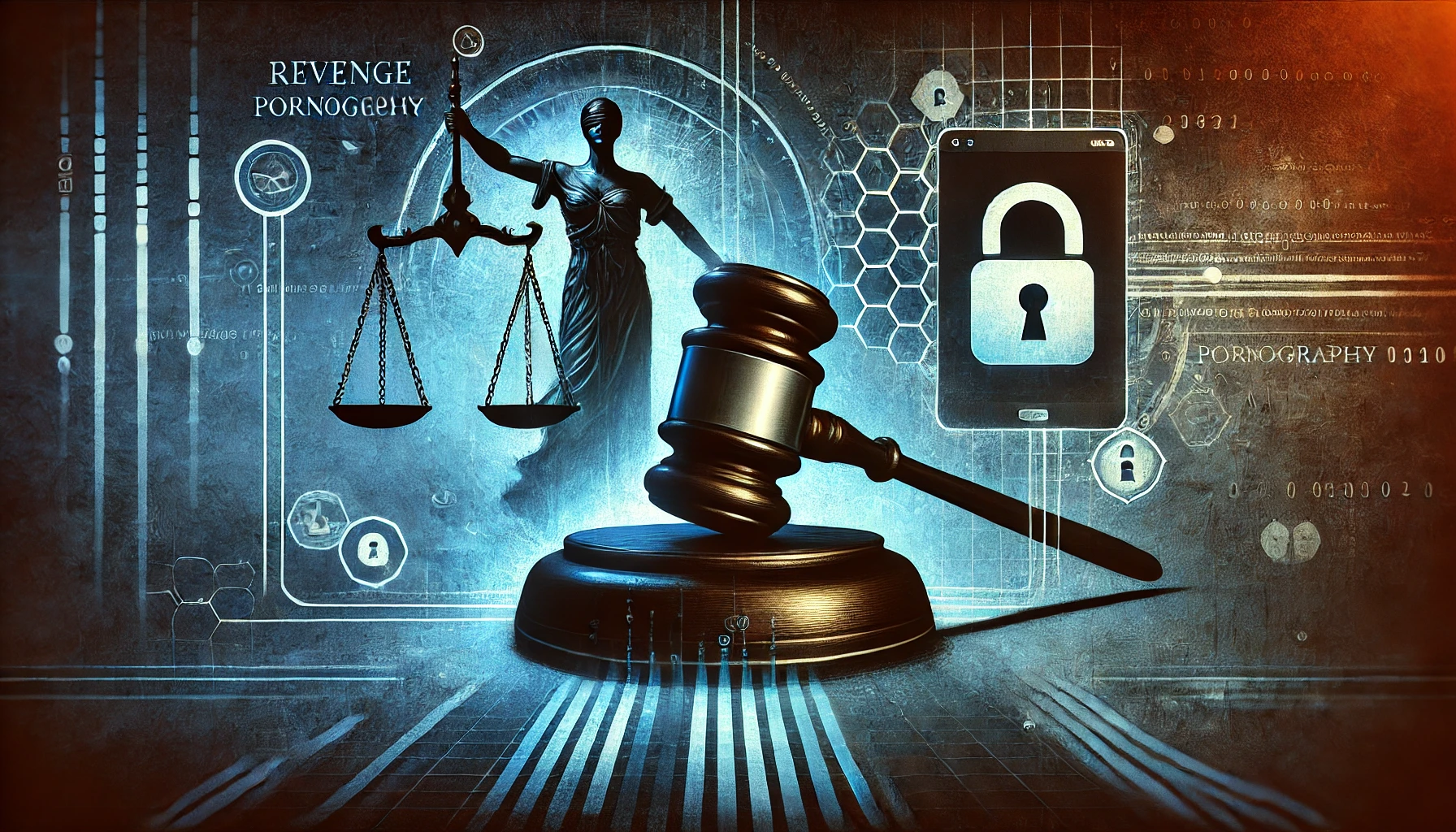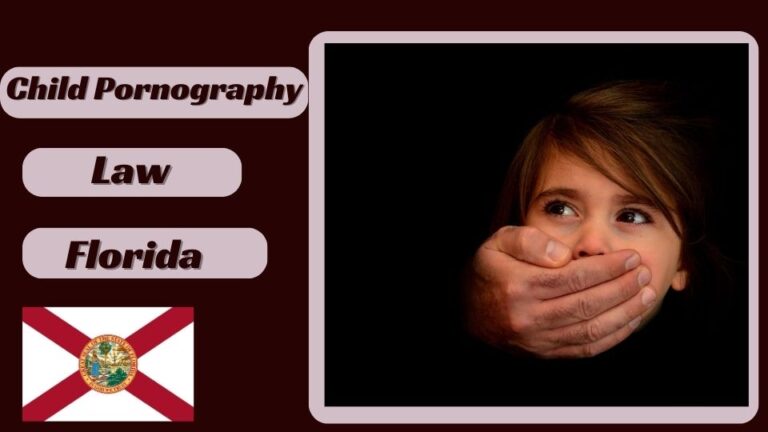Revenge Porn – State Wise Laws, History, Case Study, Crime, Needs of Laws, FAQs
Rejection from a trusted person can’t be acceptable for either boys or girls. We think we are in control, but our actual mind is going toward some bad things. Many people turn to addictions like alcohol, drugs, and smoking. However, there are also those who want to take revenge on someone by making videos or images of that person to exploit their privacy, not realizing how they can destroy someone’s life. Now you might be thinking how an image or a video can abuse or manipulate someone’s life?, and what is Revenge Porn Law?, and why the judiciary needs to make those laws?. Here, we discuss the in-depth details of revenge porn laws in different countries and related punishments.
How an image or a video can exploit someone’s life?
Now technology is increasing rapidly and covering all aspects across the world. There are many AI tools in the market that can replace faces in photos, making them look real, so we can’t differentiate if they are real or not. Think about when someone replaces your image with that of an adult content creator and posts it on social media. Many people see those photos and react, which can lead to a serious crime. It becomes a very difficult time for that person to go outside their home and live happily without interruption, as all these things exploit the person’s life.
What is Revenge porn law?
Revenge porn law is the law to protect against such types of incidents that can exploit someone’s privacy or have a bad mindset to harm and take revenge on a person, which leads to suicidal activity or can harm them mentally as well. It is also a form of cyber sexual harassment that also represents cyberbullying. There are multiple penalties or punishments in different countries or states. In this article, we will talk about revenge porn laws in the United States and related penalties.
What are the state wise revenge porn laws in the US?
In the United States, there are different laws for different states lemme tell you one by one.
Alabama
- Statute: Alabama Code, Section 13A-6-240
- What the Law Covers: In Alabama, it’s a crime to knowingly distribute a private image of another person with the intent to harass, threaten, or intimidate. The law applies when the person depicted in the image had a reasonable expectation of privacy.
- Punishments: Violation of this statute is classified as a Class A misdemeanor. Penalties can include up to one year in jail and fines up to $6,000. If the offender has prior convictions for the same offense, the charge can be elevated to a Class C felony, with penalties including up to 10 years in prison and fines up to $15,000.
Alaska
- Statute: Alaska Statutes, Section 11.61.120
- What the Law Covers: Alaska’s law prohibits the distribution of electronic or printed private images of another person without their consent, specifically when done with the intent to harass, humiliate, or cause distress.
- Punishments: Violating this law is considered a Class A misdemeanor, punishable by up to one year in jail and a fine of up to $10,000. If the offense is directed at a minor or results in significant emotional distress, the penalties may be more severe.
Arizona
- Statute: Arizona Revised Statutes, Section 13-1425
- What the Law Covers: Arizona criminalizes the intentional disclosure of a visual depiction of another person engaged in sexual activities or displaying intimate body parts without their consent. The person depicted must be identifiable, and there should have been a reasonable expectation of privacy.
- Punishments: This offense is a Class 5 felony, carrying a presumptive prison term of 1.5 years, which can be extended up to 2.5 years for repeat offenders. The crime is elevated to a Class 4 felony if the victim is recognizable and did not consent, leading to harsher penalties including longer prison terms.
Arkansas
- Statute: Arkansas Code, Section 5-26-314
- What the Law Covers: In Arkansas, it is unlawful to disclose any private, intimate image of another person without their consent. The law specifically targets disclosures made with the intent to harass, threaten, or cause emotional distress.
- Punishments: Violating this statute is classified as a Class A misdemeanor, which may result in up to one year in jail and a fine of up to $2,500. If the offender has a previous conviction for the same crime, the offense can be escalated to a Class D felony, which may lead to up to six years in prison.
California
- Statute: California Penal Code, Section 647(j)(4)
- What the Law Covers: California’s law prohibits the intentional distribution of images showing the intimate body parts or sexual conduct of another person without consent. The offender must know or should reasonably know that the distribution would cause serious emotional distress, and the person depicted must have had a reasonable expectation of privacy.
- Punishments: This crime is a misdemeanor punishable by up to six months in jail and a fine of up to $1,000. If the victim is a minor, penalties may include up to one year in jail and a fine of up to $2,000. Repeat offenders face even harsher penalties.
Colorado
- Statute: Colorado Revised Statute, Section 18-7-107, 108
- What the Law Covers: Colorado law makes it illegal to disclose private intimate images without the consent of the depicted person, particularly when the disclosure is made to harass, intimidate, or cause distress. This applies when the person depicted had a reasonable expectation of privacy.
- Punishments: This offense is classified as a Class 1 misdemeanor, punishable by up to 18 months in jail and fines up to $5,000. In cases involving minors, the offense can be escalated to a more severe felony charge, resulting in longer prison terms.
Connecticut
- Statute: Connecticut General Statutes, Section 53a-189c
- What the Law Covers: In Connecticut, it is a crime to knowingly disseminate intimate images of another person without their consent when the depicted person is identifiable and had a reasonable expectation of privacy. The law specifically addresses intent to harm or distress the person depicted.
- Punishments: This offense is a Class A misdemeanor, punishable by up to one year in jail and a fine of up to $2,000. If the victim suffers significant emotional or financial harm, civil remedies may also be available.
Delaware
- Statute: Delaware Code Title 11, Section 1335
- What the Law Covers: Delaware law criminalizes the non-consensual distribution of intimate images intended to harass, threaten, or humiliate the depicted person. The offense applies to both electronic and non-electronic dissemination.
- Punishments: This offense is classified as a Class G felony, which carries a possible prison sentence of up to two years. In cases involving multiple victims or repeat offenses, the penalties may be more severe.
Florida
- Statute: Florida Statutes, Section 784.049(3)
- What the Law Covers: Florida law makes it illegal to willfully and maliciously distribute sexually explicit images of another person without their consent, with the intent to cause substantial emotional distress.
- Punishments: This offense is a first-degree misdemeanor, punishable by up to one year in jail and a fine of up to $1,000. Repeat offenders may face a third-degree felony charge, carrying penalties of up to five years in prison and fines up to $5,000.
Georgia
- Statute: Georgia Code, Section 16-11-90
- What the Law Covers: Georgia prohibits the posting of a sexually explicit image of another person without their consent, intending to cause emotional distress. The law applies to images that the person depicted intended to keep private.
- Punishments: Violating this statute is a misdemeanor of a high and aggravated nature, which may result in a fine of up to $5,000 and up to 12 months in jail. Repeat offenses may lead to more severe penalties.
Hawaii
- Statute: Hawaii Revised Statutes, Section 711-1110.9
- What the Law Covers: Hawaii criminalizes the distribution of intimate images of another person without their consent, where the intent is to cause substantial emotional distress. The depicted person must be identifiable and have had a reasonable expectation of privacy.
- Punishments: This is classified as a misdemeanor, which can result in up to one year in jail and a fine of up to $1,000. For repeat offenses or if the victim is a minor, the penalties may be more severe.
Idaho
- Statute: Idaho Code, Section 18-6605(a)-(c)
- What the Law Covers: Idaho prohibits the distribution of sexually explicit images without the subject’s consent, specifically when it is intended to harass, annoy, or cause emotional distress.
- Punishments: This offense is considered a misdemeanor, punishable by up to one year in jail and a fine of up to $1,000. More severe penalties can apply if the offense results in serious harm or involves minors.
Illinois
- Statute: Illinois Criminal Code, Chapter 720 § 11-23.5 and Chapter 740 § 190/25
- What the Law Covers: Illinois law makes it illegal to distribute private sexual images without consent if the subject had a reasonable expectation of privacy and the intent was to cause harm.
- Punishments: The offense is classified as a Class 4 felony, which can result in one to three years in prison and fines up to $25,000. Civil remedies are also available to the victim.
Indiana
- Statute: Indiana Criminal Code, Section 35-45-4-8
- What the Law Covers: Indiana’s revenge porn statute criminalizes the distribution of an intimate image without consent, intending to harass, threaten, or humiliate the depicted person.
- Punishments: This is a Level 6 felony, which may result in six months to two and a half years in prison and a fine of up to $10,000. Enhanced penalties apply if the victim is a minor or suffers severe distress.
Iowa
- Statute: Iowa Code, Section 708.7 (1)(a)(5)
- What the Law Covers: Iowa criminalizes the non-consensual dissemination of intimate images intended to cause emotional distress. The person depicted must have had a reasonable expectation of privacy.
- Punishments: The offense is considered an aggravated misdemeanor, punishable by up to two years in jail and a fine ranging from $625 to $6,250. Higher penalties can apply for repeat offenses or severe emotional distress.
Kansas
- Statute: Kansas Statutes, Section 21-6101(a)(8)
- What the Law Covers: Kansas makes it illegal to disseminate a private, intimate image without consent, intending to harass, threaten, or intimidate. The law applies when the person depicted had a reasonable expectation of privacy.
- Punishments: This is a Class A misdemeanor, with penalties including up to one year in jail and fines up to $2,500. Civil remedies are also available for victims.
Kentucky
- Statute: Kentucky Statutes, Section 531.120
- What the Law Covers: Kentucky criminalizes the distribution of private sexual images without consent when intended to cause harm. The person depicted must have a reasonable expectation of privacy.
- Punishments: The offense is classified as a Class A misdemeanor, punishable by up to 12 months in jail and a fine of up to $500. For repeat offenses or if the victim suffers significant harm, more severe penalties may apply.
Louisiana
- Statute: Louisiana Revised Statutes, Section 14:283.2
- What the Law Covers: Louisiana law prohibits the intentional disclosure of private sexual images without the consent of the person depicted, specifically when intended to harass or cause emotional distress.
- Punishments: This offense is a misdemeanor, punishable by up to six months in jail and a fine of up to $1,000. If the victim is a minor or the offense results in severe distress, the penalties can be more severe.
Maine
- Statute: Maine Criminal Code, 17A MRSA Section 511-A
- What the Law Covers: Maine prohibits the unauthorized dissemination of private intimate images, intending to cause harm, harassment, or emotional distress. The person depicted must have had a reasonable expectation of privacy.
- Punishments: This is classified as a Class D crime, which can result in up to 364 days in jail and a fine of up to $2,000. Enhanced penalties may apply for repeat offenses or cases involving minors.
Maryland
- Statute: Maryland Criminal Law Code, Section 3-809
- What the Law Covers: Maryland makes it illegal to distribute a private, intimate image without consent, specifically when intended to harass, threaten, or cause emotional distress.
- Punishments: The offense is classified as a misdemeanor, punishable by up to one year in jail and a fine of up to $5,000. Civil remedies are also available for victims seeking damages.
Massachusetts
- Statute: Massachusetts General Laws chapter 272
- What the Law Covers: Massachusetts criminalizes the non-consensual dissemination of private sexual images, specifically when intended to harass, intimidate, or cause emotional distress.
- Punishments: Violating this law is considered a misdemeanor, which can lead to up to two and a half years in jail and a fine of up to $5,000. Enhanced penalties apply for repeat offenses.
Michigan
- Statute: Michigan Codified Laws, Section 750.145e
- What the Law Covers: Michigan law makes it illegal to distribute sexually explicit images of another person without their consent, with the intent to cause emotional distress.
- Punishments: The offense is classified as a misdemeanor, punishable by up to one year in jail and a fine of up to $1,000. If the victim is a minor or if the offense results in significant harm, more severe penalties may apply.
Minnesota
- Statute: Minnesota Statutes, Section 617.261 or Crime Section 604.31
- What the Law Covers: Minnesota prohibits the non-consensual dissemination of private sexual images, particularly when intended to harass, intimidate, or cause emotional distress.
- Punishments: This offense is a gross misdemeanor, punishable by up to one year in jail and a fine of up to $3,000. Repeat offenders may face felony charges with longer prison sentences.
Mississippi
- Statute: Mississippi Code Annotated, Section 97-29-64.1
- What the Law Covers: Mississippi criminalizes the intentional distribution of private, intimate images without consent, intending to harass, threaten, or cause emotional distress.
- Punishments: This offense is classified as a misdemeanor, with penalties including up to one year in jail and a fine of up to $5,000. More severe penalties may apply for repeat offenses or cases involving minors.
Missouri
- Statute: Revised Statues of Missouri, Section 573.110 & 573.112
- What the Law Covers: Missouri law makes it illegal to knowingly disseminate a private sexual image of another person without their consent, intending to cause emotional distress or harm.
- Punishments: This offense is a Class D felony, which can result in up to seven years in prison and fines. More severe penalties apply for repeat offenses or if the victim suffers significant harm.
Montana
- Statute: Montana Code Annotated, Section 45-8-213 (1)(d)
- What the Law Covers: Montana prohibits the dissemination of intimate images without consent, specifically when intended to harass, threaten, or cause emotional distress.
- Punishments: This offense is classified as a misdemeanor, punishable by up to one year in jail and a fine of up to $1,000. Civil remedies may also be available for victims seeking damages.
Nebraska
- Statute: Nebraska Revised Statutes, Section 28-311.08, Section 25-3503
- What the Law Covers: Nebraska criminalizes the distribution of intimate images without consent, intending to harass, threaten, or cause emotional distress. The person depicted must have had a reasonable expectation of privacy.
- Punishments: This offense is classified as a Class I misdemeanor, punishable by up to one year in jail and a fine of up to $1,000. More severe penalties may apply for repeat offenses.
Nevada
- Statute: Nevada Revised Statutes, Section 200-780
- What the Law Covers: Nevada makes it illegal to intentionally distribute intimate images of another person without consent, particularly when intended to harass, threaten, or cause emotional distress.
- Punishments: This is a gross misdemeanor, which can result in up to one year in jail and a fine of up to $2,000. Felony charges may apply for repeat offenses or if the victim is a minor.
New Hampshire
- Statute: New Hampshire Revised Statutes, Section 644:9-a
- What the Law Covers: New Hampshire prohibits the unauthorized dissemination of private sexual images, especially when intended to harass, intimidate, or cause emotional distress.
- Punishments: This offense is considered a Class A misdemeanor, punishable by up to one year in jail and a fine of up to $2,000. More severe penalties apply for repeat offenses or cases involving significant harm.
New Jersey
- Statute: New Jersey Code, Section 2C:14-9
- What the Law Covers: New Jersey law makes it illegal to disclose intimate images without the subject’s consent, with the intent to cause emotional distress or harm.
- Punishments: This offense is classified as a third-degree crime, punishable by three to five years in prison and a fine of up to $15,000. Civil remedies are also available for victims.
New Mexico
- Statute: New Mexico Statutes, Section 30-37A-1
- What the Law Covers: New Mexico criminalizes the intentional distribution of intimate images without consent, specifically when intended to harass, threaten, or cause emotional distress.
- Punishments: This offense is considered a misdemeanor, punishable by up to one year in jail and a fine of up to $1,000. Enhanced penalties apply for repeat offenses or if the victim is a minor.
New York
- Statute: Consolidated Laws of New York, Section 245.15
- What the Law Covers: New York prohibits the unauthorized dissemination of intimate images with the intent to cause emotional distress or harm. The person depicted must have had a reasonable expectation of privacy.
- Punishments: This offense is a Class A misdemeanor, which can lead to up to one year in jail and fines up to $1,000. More severe penalties apply for repeat offenses or cases involving significant harm.
North Carolina
- Statute: General Statutes, Section 14-190.5A
- What the Law Covers: North Carolina criminalizes the distribution of private, intimate images without consent, with the intent to harass, threaten, or cause emotional distress.
- Punishments: This offense is classified as a Class H felony, which can result in four to eight months in prison. Enhanced penalties apply for repeat offenses or cases involving significant harm.
North Dakota
- Statute: North Dakota Century Code, Section 12.1-17-07.2
- What the Law Covers: North Dakota prohibits the dissemination of intimate images without consent, especially when intended to harass, intimidate, or cause emotional distress.
- Punishments: This offense is classified as a Class A misdemeanor, punishable by up to one year in jail and a fine of up to $3,000. More severe penalties apply for repeat offenses or cases involving minors.
Ohio
- Statute: Ohio Revised Code, Section 2917.211(B)
- What the Law Covers: Ohio criminalizes the distribution of intimate images without consent, intending to harass, threaten, or cause emotional distress.
- Punishments: This offense is classified as a first-degree misdemeanor, punishable by up to six months in jail and a fine of up to $1,000. More severe penalties apply for repeat offenses or if the victim is a minor.
Oklahoma
- Statute: Oklahoma Statutes, Section 1040.13b
- What the Law Covers: Oklahoma makes it illegal to distribute intimate images without consent, particularly when intended to harass, threaten, or cause emotional distress.
- Punishments: This offense is a misdemeanor, punishable by up to one year in jail and a fine of up to $1,000. Enhanced penalties apply for repeat offenses or cases involving significant harm.
Oregon
- Statute: Oregon Revised Statutes, Section 163.472
- What the Law Covers: Oregon prohibits the non-consensual dissemination of intimate images, intending to harass, threaten, or cause emotional distress.
- Punishments: This offense is classified as a Class A misdemeanor, which can lead to up to one year in jail and fines up to $6,250. More severe penalties apply for repeat offenses or cases involving significant harm.
Pennsylvania
- Statute: Pennsylvania Consolidated Statutes, Title 18 Section 3131
- What the Law Covers: Pennsylvania law makes it illegal to distribute intimate images without the subject’s consent, intending to harass, threaten, or cause emotional distress.
- Punishments: This offense is considered a first-degree misdemeanor, punishable by up to five years in prison and a fine of up to $10,000. Enhanced penalties apply for repeat offenses or cases involving minors.
Rhode Island
- Statute: Rhode Island General Laws, Section 11-64-3
- What the Law Covers: Rhode Island criminalizes the intentional dissemination of intimate images without consent, especially when intended to harass, threaten, or cause emotional distress.
- Punishments: This offense is classified as a misdemeanor, punishable by up to one year in jail and a fine of up to $1,000. Civil remedies may also be available for victims.
South Carolina
- Statute: South Carolina Code section16-17-470
- What the Law Covers: South Carolina prohibits the distribution of intimate images without consent, intending to harass, threaten, or cause emotional distress.
- Punishments: This offense is classified as a misdemeanor, punishable by up to one year in jail and a fine of up to $500. More severe penalties may apply for repeat offenses or cases involving significant harm.
South Dakota
- Statute: South Dakota Statutes, Section 22-21-4
- What the Law Covers: South Dakota criminalizes the unauthorized dissemination of intimate images, particularly when intended to harass, threaten, or cause emotional distress.
- Punishments: This offense is considered a Class 1 misdemeanor, punishable by up to one year in jail and a fine of up to $2,000. Enhanced penalties apply for repeat offenses or if the victim is a minor.
Tennessee
- Statute: Tennessee Code, Section 39-17-318
- What the Law Covers: Tennessee makes it illegal to distribute private sexual images without consent, intending to harass, threaten, or cause emotional distress.
- Punishments: This offense is classified as a Class A misdemeanor, punishable by up to one year in jail and a fine of up to $2,500. More severe penalties apply for repeat offenses or cases involving significant harm.
Texas
- Statute: Texas Penal Code, Section 21.16
- What the Law Covers: Texas law prohibits the non-consensual dissemination of intimate images, specifically when intended to harass, threaten, or cause emotional distress.
- Punishments: This offense is a Class A misdemeanor, which can result in up to one year in jail and a fine of up to $4,000. Enhanced penalties apply for repeat offenses or cases involving minors.
Utah
- Statute: Utah Criminal Code, Section 76-5b-203
- What the Law Covers: Utah criminalizes the intentional distribution of intimate images without consent, intending to harass, threaten, or cause emotional distress.
- Punishments: This offense is considered a Class A misdemeanor, punishable by up to one year in jail and a fine of up to $2,500. More severe penalties apply for repeat offenses or if the victim is a minor.
Vermont
- Statute: Vermont Statutes, 13 V.S.A. Section 2606
- What the Law Covers: Vermont prohibits the dissemination of private sexual images without consent, intending to harass, threaten, or cause emotional distress.
- Punishments: This offense is classified as a misdemeanor, punishable by up to two years in prison and a fine of up to $2,000. Civil remedies may also be available for victims seeking damages.
Virginia
- Statute: Code of Virginia, Section 18.2-386.2
- What the Law Covers: Virginia makes it illegal to distribute intimate images without consent, specifically when intended to harass, threaten, or cause emotional distress.
- Punishments: This offense is a Class 1 misdemeanor, punishable by up to one year in jail and a fine of up to $2,500. More severe penalties apply for repeat offenses or cases involving significant harm.
Washington
- Statute: Washington Revised Code, Section 9A.86.010
- What the Law Covers: Washington prohibits the intentional distribution of intimate images without consent, with the intent to harass, threaten, or cause emotional distress.
- Punishments: This offense is classified as a gross misdemeanor, punishable by up to one year in jail and a fine of up to $5,000. Enhanced penalties apply for repeat offenses or if the victim is a minor.
West Virginia
- Statute: Code of West Virginia, Section 61-8-28a
- What the Law Covers: West Virginia criminalizes the dissemination of private sexual images without consent, intending to harass, threaten, or cause emotional distress.
- Punishments: This offense is considered a misdemeanor, punishable by up to one year in jail and a fine of up to $5,000. More severe penalties may apply for repeat offenses or if the victim is a minor.
Wisconsin
- Statute: Code of Wisconsin, Section 942.09
- What the Law Covers: Wisconsin makes it illegal to distribute private intimate images without consent, intending to harass, threaten, or cause emotional distress.
- Punishments: This offense is classified as a Class I felony, which can lead to up to three years and six months in prison and fines up to $10,000. Civil remedies are also available for victims.
Wyoming
- Statute: Wyoming Statutes, Section 6-4-306
- What the Law Covers: Wyoming criminalizes the distribution of intimate images without consent, particularly when intended to harass, threaten, or cause emotional distress.
- Punishments: This offense is considered a misdemeanor, punishable by up to six months in jail and a fine of up to $750. More severe penalties apply for repeat offenses or cases involving minors.
Why do we need revenge porn laws – History and some aspects?
Safety is the top priority of every nation, but when we talk about privacy, it can be a very serious aspect of suicidal activity. There are multiple factors to be remembered regarding why judiciaries need to make revenge pornography laws. So here, we will talk about the revenge porn history and some important aspects that may be the possible reasons for implementing revenge porn laws.
History of revenge porn laws
Revenge porn, though it seems like a recent issue, has roots that stretch back to the 1950s. The earliest known case involved “Marilyn Monroe”, whose nude photos were published in Playboy without her consent, causing a scandal and deeply affecting her life. Today, with advancements in technology, the reach and impact of revenge porn have expanded significantly.
Revenge porn involves sharing private, often intimate, images without the subject’s consent, typically as a form of retribution after a relationship ends. The rise of the internet and social media has made it easier for perpetrators to distribute these images widely, causing significant emotional and social harm to victims.
One of the most notable modern cases occurred in 2018 with former “Missouri Governor Eric Greitens”, who was accused of using revenge porn tactics to blackmail a woman he had an affair with. This case brought the issue into the public eye, highlighting the complexities of addressing revenge porn legally.
Despite its long history, the laws around revenge porn remain unclear and inconsistent across different states. This study delves into the legislation surrounding revenge porn, analyzing how it has been handled in various state laws. The findings reveal that while some states have made progress in creating specific laws against revenge porn, much of the legislation is still vague and not well-aligned with how this crime is perpetrated. This inconsistency points to the need for clearer policies and further research to protect victims better and hold perpetrators accountable.
why we need revenge pornography laws:
- Protecting Victims: Laws can help keep people safe from the emotional and mental pain and embarrassment of having their private images shared without permission.
- Stopping Offenders: Clear laws can make people think twice before sharing someone else’s private photos, knowing they could face serious punishments for that.
- Fair Legal Treatment: Consistent laws ensure that everyone gets treated fairly, no matter where they live or what background they belong.
- Handling Online Abuse: We know how fast images can spread online, and we need laws to keep up and protect people from this kind of online abuse or cyberbullying.
- Helping Police: Well-defined laws make it easier for police to catch and prosecute those who break them.
- Respecting Privacy: Everyone has the right to keep their private photos private, and laws can help protect that right.
- Long-term Damage: Laws can reduce the lasting harm that victims often face, like damage to their reputation and mental health, or sometimes people don’t handle the pressure and take the wrong steps.
- Raising Awareness: Laws can also support efforts to educate the public about the dangers and consequences of revenge porn and tell what is right and wrong, when you do this you have to face the outcomes
Revenge porn law statistics
Graph of overall survey, with 1,606 total respondents and 361 identified as victims of revenge porn.
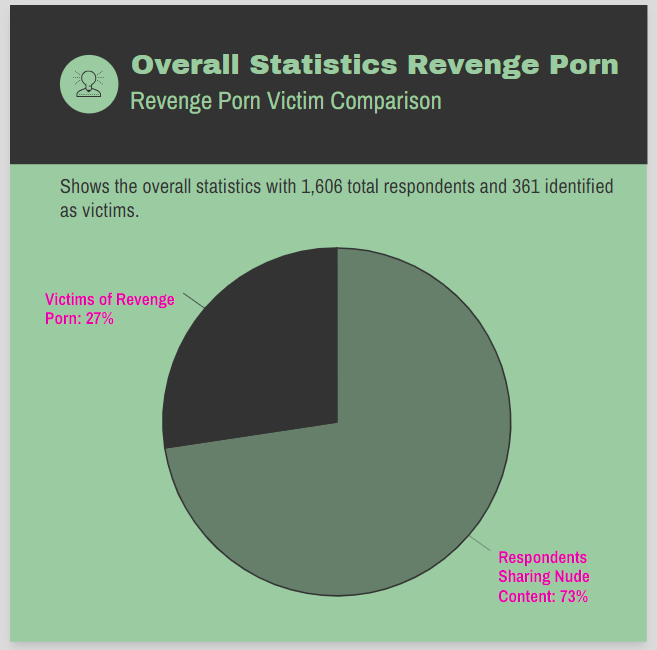
Measures victims have taken, including changing email addresses and closing social media accounts, to escape harassment
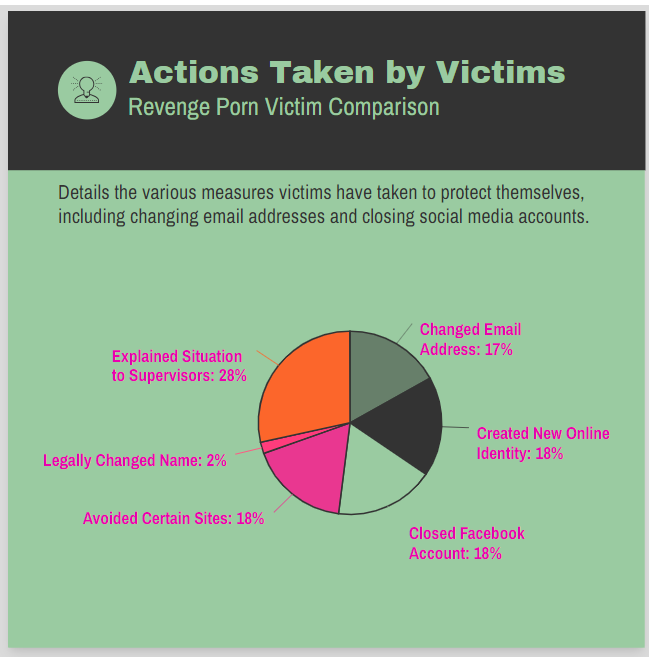
Harassment and stalking that victims face both online and offline after their material is shared.
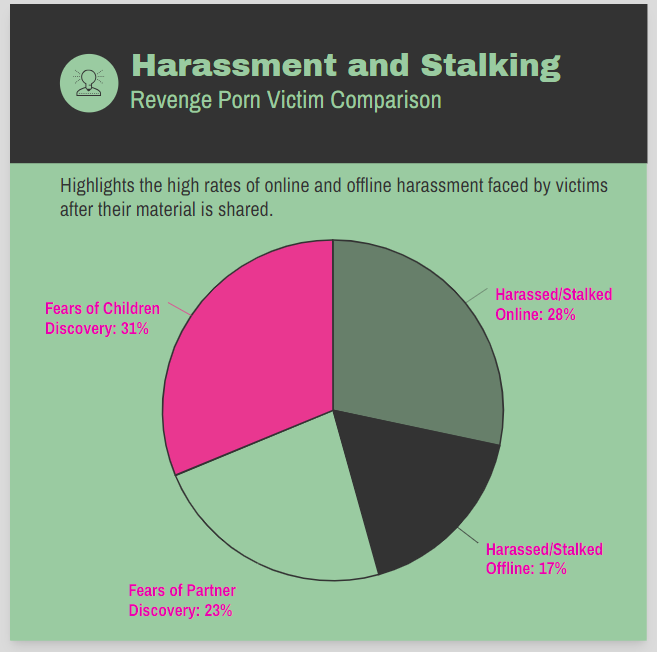
The graph highlights the several emotional and psychological victims of revenge porn, with 93% experiencing significant emotional distress and 82% reporting impairment in social and occupational functioning, underscoring the profound mental health impact of this abuse.
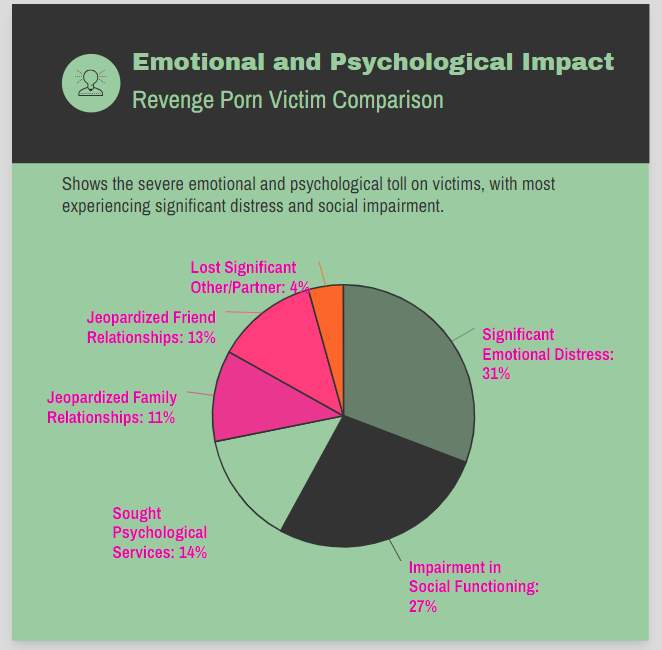
The graph shows the types of personal information most commonly shared alongside revenge porn material, with 59% including the victim’s full name, followed by 49% featuring social network info, revealing the invasive nature of these violations.
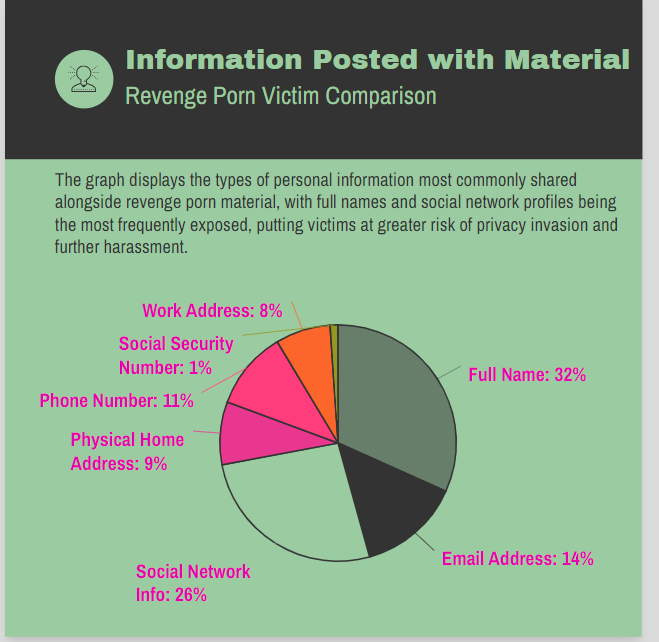
Perpetrators of revenge porn graph with 57% being ex-boyfriends, followed by ex-friends and family members, illustrating the betrayal by trusted individuals.
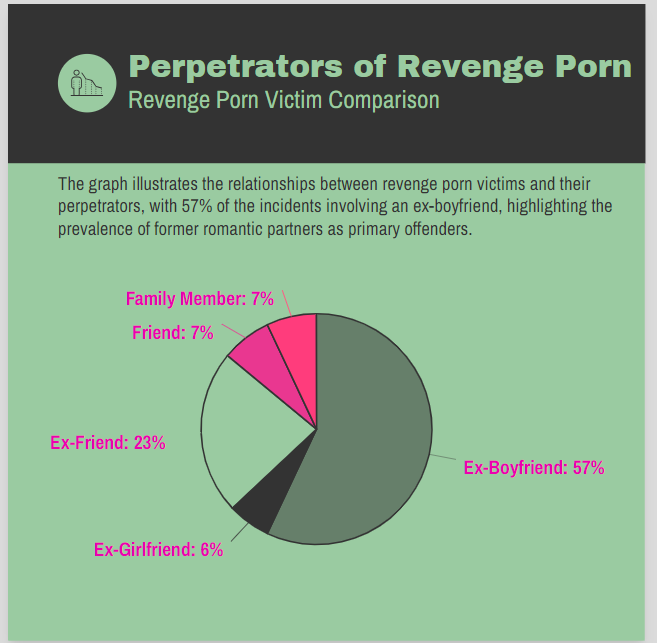
The following graph illustrates the demographics of victims, emphasizing the overwhelming prevalence among young women aged 18-30.
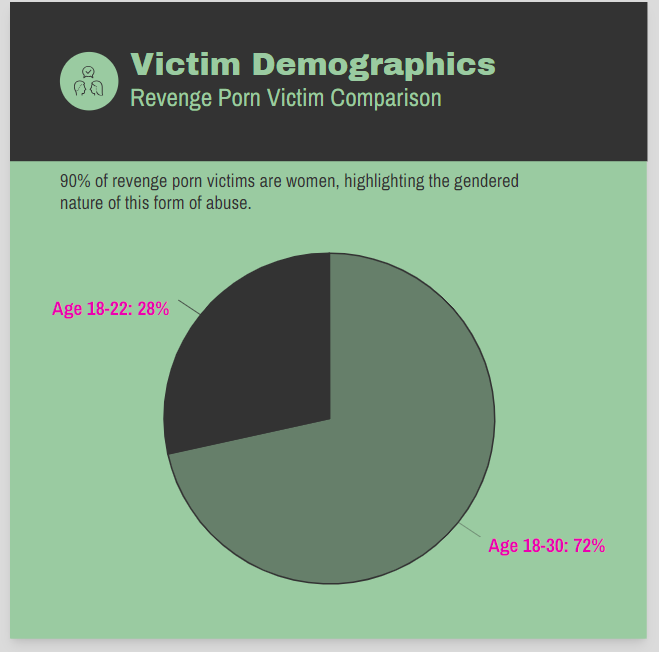
Revenge porn laws FAQ.
How to report revenge porn in the US?
- Report the incident to your local police department. Provide them with as much evidence as possible, including screenshots, links, and any communication related to the incident.
- If the content was shared across state lines or involves hacking, you can report it to the FBI’s Internet Crime Complaint Center (IC3) at www.ic3.gov.
- Organizations like the Cyber Civil Rights Initiative (CCRI) offer resources and support for victims of revenge porn. They also have a 24/7 crisis hotline: 1-844-878-2274.
or consulting with an attorney who specializes in internet privacy or criminal law. They can help you understand your rights and navigate the legal system.
Is revenge porn a crime?
Yes, revenge porn is a crime in many parts of the United States. It involves sharing intimate images or videos without someone’s consent, often as an act of revenge after a relationship ends. To fight this crime, many states have passed laws that make revenge porn illegal. These laws can differ from state to state, but the punishment usually includes fines, jail, or sometimes both.
